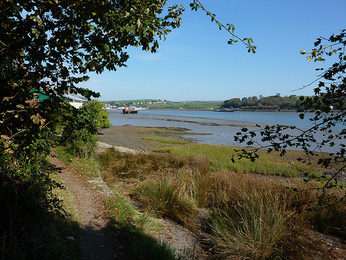 The Torridge Estuary Martin Shelley (CC BY 2.0)
The Torridge Estuary Martin Shelley (CC BY 2.0) This project is all about pushing the boundaries of 'polite' research conversations to see who or what might be included. So we're really excited to be involved in a process where we need to think about how to include water as an active participant in research.
In a way, this sounds like the craziest of all our ventures, but in my initial discussions with Antony, when we were preparing the original bid, I asked him whether it might be possible to take account of the capacities, qualities and agency of water in the research process. His answer was "of course". In a sense this is already what water management strategies are required to do. A water engineer is already expected to know these things as part of their job. This made me wonder whether it might be possible to say that water actually already has more of a 'voice' in the research process, than dogs, for example, where full knowledge of their capacities and qualities is not a pre-requisite for working with them. Even so, I remembered from my former life as a graduate at Mouchel, working on waste water projects, that the emphasis when working with water was more on controlling it than supporting its ability to remake places as it wanted to (for example through the use of Sustainable Urban Drainage Systems).
In discussing how Antony might organise the workshop two main issues came up. First how were we going to actually have a conversation with water? The first day was set aside for this, and once I reassured Antony that everyone really was up for some adventurous encounters, he suggested that we might go out on kayaks, go snorkelling or explore other ways to get out onto the estuary and interact with the river. The second question was what would our focus be? Having a particular issue to frame our readings, thought processes and planning would hopefully help us drill down into some specific issues rather than only talking about water in general. The issue of control had been an important one in our reflections on the In Conversation with Dogs workshop and Antony suggested the flood control would be an obvious topic that might help us combine our observations across those two workshops. We could then explore how methods of flood control affect the 'aliveness' of the river. We could also draw on the participatory research already done with communities affected by flooding such as the Knowledge Controversies project led by Sarah Whatmore.
Antony will be writing a post for the blog to help us think through this further, and we'll also be having discussions with Andrew Bell from the North Devon Biosphere reserve who will be helping to lead the first day. So more thinking and planning to do, but it's shaping up to be a very exciting workshop.
Michelle Bastian
 RSS Feed
RSS Feed
